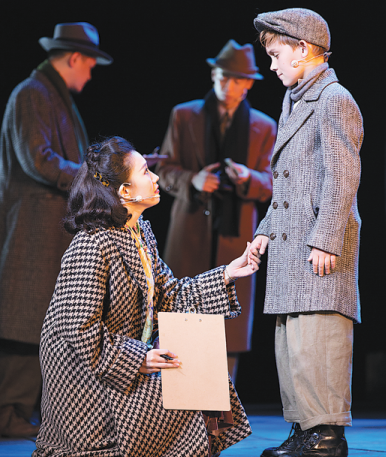 |
|
Three Shanghai-themed plays, including The Eternal Snow Beaut and Jews in Shanghai, will be staged in Beijing in June.[Photo/China Daily] |
Set in the 1940s Shanghai, the play is based on the life of Shanghai merchant Shen Laizhou, who started out with a small shop in 1927 and then went on to open the first factory to produce woolen goods in 1935. Today, the brand is a leader in textiles and wool products in China.
"Though the events on which the play is based took place decades ago, the lessons they offer still apply to contemporary society, especially young entrepreneurs," says Xu.
Besides plays, the director also produced a bilingual musical called Jews in Shanghai, which tells the story of Jewish refugees who came to Shanghai during World War II and the bond that developed between Jews and the people of Shanghai.
Featuring both Chinese and Israeli artists, the musical premiered in September in Shanghai and received critical acclaim.
Xu spent three years collecting information for the script. He then went to Israel to seek actors and he chose Sivan Kissinger to be the lead actress. He also picked four other Israelis to perform in the musical.
Sivan Kissinger's great grandfather was a famous lawyer in Germany but he was fired from his position in a lawyers' organization in his town because he was a Jew.
So, in 1938, he gathered most of his family, including Sivan Kissinger's grandmother, Oda Kissinger, and left the country on the last legal vessel to leave Germany before the war began.
Speaking of the parallels between the role and her family's history, the 26-year-old actress, who was born in Israel and pursued her acting studies in New York, says: "My character Rena, who escaped from Europe, is around the age as my grandmother would have been when she left Germany. I didn't know my grandmother's story until I started researching my character.
"It feels like I'm closing a circuit, by telling the story of my family and the Jewish people who survived the Holocaust."
According to Xu, there are more than 20 theaters around People's Square in Huangpu district of Shanghai, and they staged more than 2,000 performances in 2015.
He says that by 2020, the number of theaters in the area will double, which will make the place a drama zone in the city.
But, he asks, what about the Shanghai flavor?
He wonders how many of the plays will be remembered by the audiences and how many of them will still be staged 10 or 20 years later.
"I hope the works, which tell stories about the city and the people in particular, will be the ones which bring out emotion and memories," says Xu.